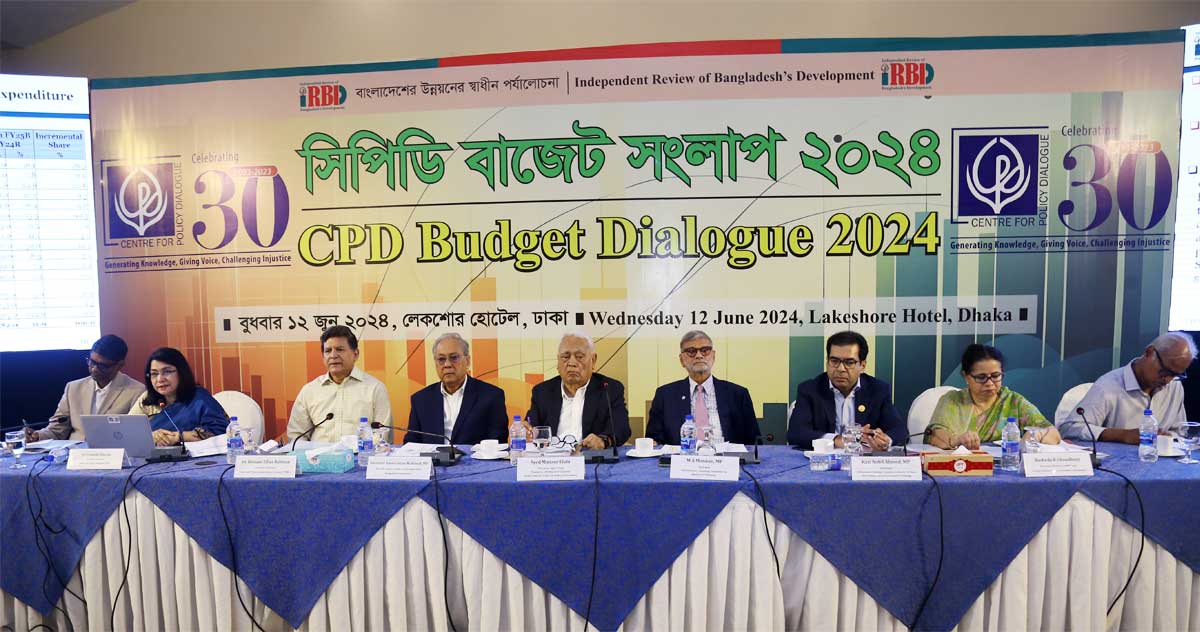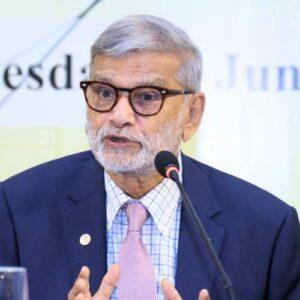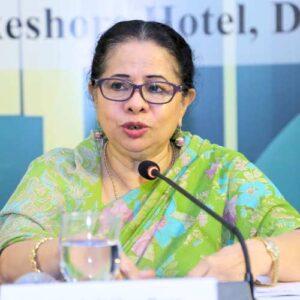
The National Budget for FY2024-25 is an ordinary budget presented during extraordinary times. Unfortunately, it falls short of addressing the ongoing economic concerns with effective measures. The strategies proposed to curb inflation and provide relief to the poor and fixed-income individuals are insufficient. Moreover, the projected economic indicators for FY2024-25, including the inflation rate, Gross Domestic Product (GDP) growth, and investment levels, appear overambitious and fail to account for the current economic realities. Consequently, many budgetary targets for FY2024-25 are likely to be missed. More critically, the inability to fully acknowledge the nature of the ongoing economic challenges has resulted in the formulation of inadequate and weak budgetary measures. Without a realistic assessment and appropriate response to these challenges, the budget’s effectiveness in driving economic stability and growth remains highly questionable.
These observations emerged at the CPD Budget Dialogue 2024 organised by the Centre for Policy Dialogue (CPD) on Wednesday, 12 June, 2024, under its flagship programme ‘Independent Review of Bangladesh’s Development (IRBD)’.
On behalf of the IRBD team, Dr Fahmida Khatun, Executive Director, CPD, highlighted some key observations of CPD on the proposed National Budget for FY2024-25. CPD’s observation revealed that the current state of affairs has been ignored while projecting the FY2024-25 macroeconomic framework. The projection for FY2024-25 does not align with the earlier estimation for private sector investment. Inflation is expected to fall drastically to 6.5 per cent in FY2024-25, compared to the 8 per cent projected for FY2023-24. Throughout FY2023-24, inflation remained high, averaging over 9 per cent. Consequently, the inflation projection for FY2024-25 appears overly optimistic. The targets to be set for the macroeconomic framework for FY2024-25 did not take cognisance of the current realities, which is quite similar to the previous budget.
- Social Safety Net Budget of Bangladesh: Catching Some, Missing Many
- Health Budget of Bangladesh Optimising Resources for Improved Health Outcomes
- Gender Budget of Bangladesh
- Education Budget of Bangladesh Investing Resources for Improved Learning Outcomes
- Climate Budget in Bangladesh Balancing Needs Building Resilience
‘Credibility of the proposed fiscal framework remains debatable’, stated the Executive Director of CPD. She elaborated that while the revenue mobilisation is projected to grow by 13.2 per cent, outpacing the public expenditure growth of 11.6 per cent, achieving this target seems ambitious. Given the ambitious revenue growth targets and the projected declines in other revenue sources, the fiscal framework’s credibility hinges on the government’s ability to meet these optimistic projections.

Dr Khatun underscored that prioritisation of public expenditure is questionable. The public services sector and interest payments take the top two spots, indicating significant allocations that might not directly contribute to development outcomes. Meanwhile, the budgets for Local Government and Rural Development (LGRD) and the agriculture sectors have declined, which contradicts the stated priority given to these sectors in the budget speech. Specifically, the budget speech emphasised the importance of education, health, agriculture, local government, rural development, power, communication, and science and technology. Despite this, sectors like LGRD and agriculture, which are critical for rural development and food security, have seen reduced funding.
‘Annual Development Programme (ADP) for FY2024-25 followed its usual pattern by maintaining consistent allocation trends and prioritisation similar to previous years’ highlighted Dr Khatun. She said that in FY2024-25, the ADP is set at BDT 265,000 crore, equivalent to 4.7 per cent of GDP, a slight increase from the previous fiscal year. Assuming an 80 per cent implementation rate for FY2023-24’s ADP, FY2024-25’s allocation is expected to be nearly 26.0 per cent higher than the likely actual spending in FY2023-24.

The Executive Director echoed that the measures for curbing inflation and providing relief to the poor and fixed income people are inadequate. The budget speech acknowledged inflation as the primary challenge, yet the proposed changes in the Personal Income Tax (PIT) structure do not provide substantial relief to low-income groups. The tax-exempt income threshold remains unchanged, and the highest PIT rate increased from 25 per cent to 30 per cent. This change benefits higher-income individuals, while those with monthly taxable income between BDT 29,167 and BDT 37,500 receive no tax relief.
CPD’s observation also highlighted that the desperate moves for revenue mobilisation amid macroeconomic instability is concerning. In the FY2024-25 budget, various measures were proposed to increase tax revenue, which include aligning Value-Added Tax (VAT) rates with the VAT and SD Act, 2012, as recommended by the International Monetary Fund (IMF). For instance, there is an increase in Supplementary Duty (SD) on items like ice cream and mobile telecom services, and an increase in VAT on locally manufactured products such as mango juice and energy-saving bulbs. These increases are likely to be passed on to consumers, raising the cost of living.

Dr Khatun also highlighted that allocations for priority social sectors remain sources of concern and that the issue of employment generation did not receive adequate attention.
Mr Syed Manzur Elahi, Treasurer, CPD Board of Trustees and Former Advisor to the Caretaker Government, chaired the session and said ‘The most urgent task right now is to control inflation and boost foreign exchange reserves’.
Barrister Anisul Islam Mahmud, MP, Hon’ble Deputy Leader of the Opposition, Bangladesh Parliament, highlighted ‘The economy of Bangladesh had been growing steadily since 2008, but it encountered significant challenges in 2022 when it needed to make serious adjustments due to its impending Least developed countries (LDCs) graduation. At a time when the economy needed to be at its strongest, it is now at its weakest; and Bangladesh has never been in such a weak position’. He called for stopping corruption and syndicates, and ensuring transparency, stating that without these measures, the country will never be in a good position.

Mr M A Mannan, MP, Chairman, Parliamentary Standing Committee on Ministry of Planning, remarked ‘Inflation has been increasing slowly and gradually, but it has not surged rapidly; if it had, the outcome would have been much worse. It is commendable how resilient our economy is, as it has prevented inflation from rising too quickly. I believe that inflation is a byproduct of economic growth. Sacrificing this growth to control inflation could have adverse effects’.
While discussing the allocation in the agriculture sector, Mr Kazi Nabil Ahmed, MP, Chairman, Parliamentary Standing Committee on Ministry of Posts, Telecommunications & Information Technology, noted ‘The production of food in the agriculture sector has been continuously improving. Bangladesh is now producing various sources of protein domestically, rather than relying on imports, and is becoming self-sufficient’. He added that strategies need to be formulated to enhance production in businesses to further develop the private sector.

Dr Hossain Zillur Rahman, Executive Chairman, Power and Participation Research Centre (PPRC) underscored ‘The analysis of the new budget reveals a scarcity of resources, along with a significant lack of development strategy and governance. Bangladesh is currently at a critical juncture as it is poised to graduate from its LDC status soon. In this situation, it is imperative to develop better strategies, improve governance, and utilise our limited resources efficiently’.
Ms Rasheda K Choudhury, Executive Director, CAMPE, highlighted ‘The budget allocation for the education sector has increased slightly, but the number of students has risen significantly. This raises the question: How much are we investing in each student? A calculation would likely reveal that per-student investment is lower than before. Despite promises to prioritise the education and health sectors, the new budget reflects a deprioritisation of these areas’.

Mr Razequzzaman Ratan, President, Socialist Labour Front ‘Despite the increase in GDP and per capita income, as well as rising budget allocations, the incomes of labourers and farmers—who are primarily responsible for this growth—remain stagnant. Immediately following the budget announcement, commodity prices rise, money laundering intensifies, and the prevalence of black money increases. However, labourers do not benefit from these developments’.
While commenting on the inefficiencies of the power and energy sector, Mr Dewan Hanif Mahmud, Editor, Banik Barta, stated ‘The budget allocation for the power and energy sector is substantial, indicating inefficient allocation of resources. The subsidies provided in this sector exert immense pressure on the government, creating liabilities that have led to the issuance of bonds’.
The event was followed by an intriguing open-floor discussion. High-level policymakers, diplomats, foreign delegates, researchers, development practitioners, academicians, business leaders, civil society representatives, development partners, and journalists participated in the dialogue and shared their valuable insights.


